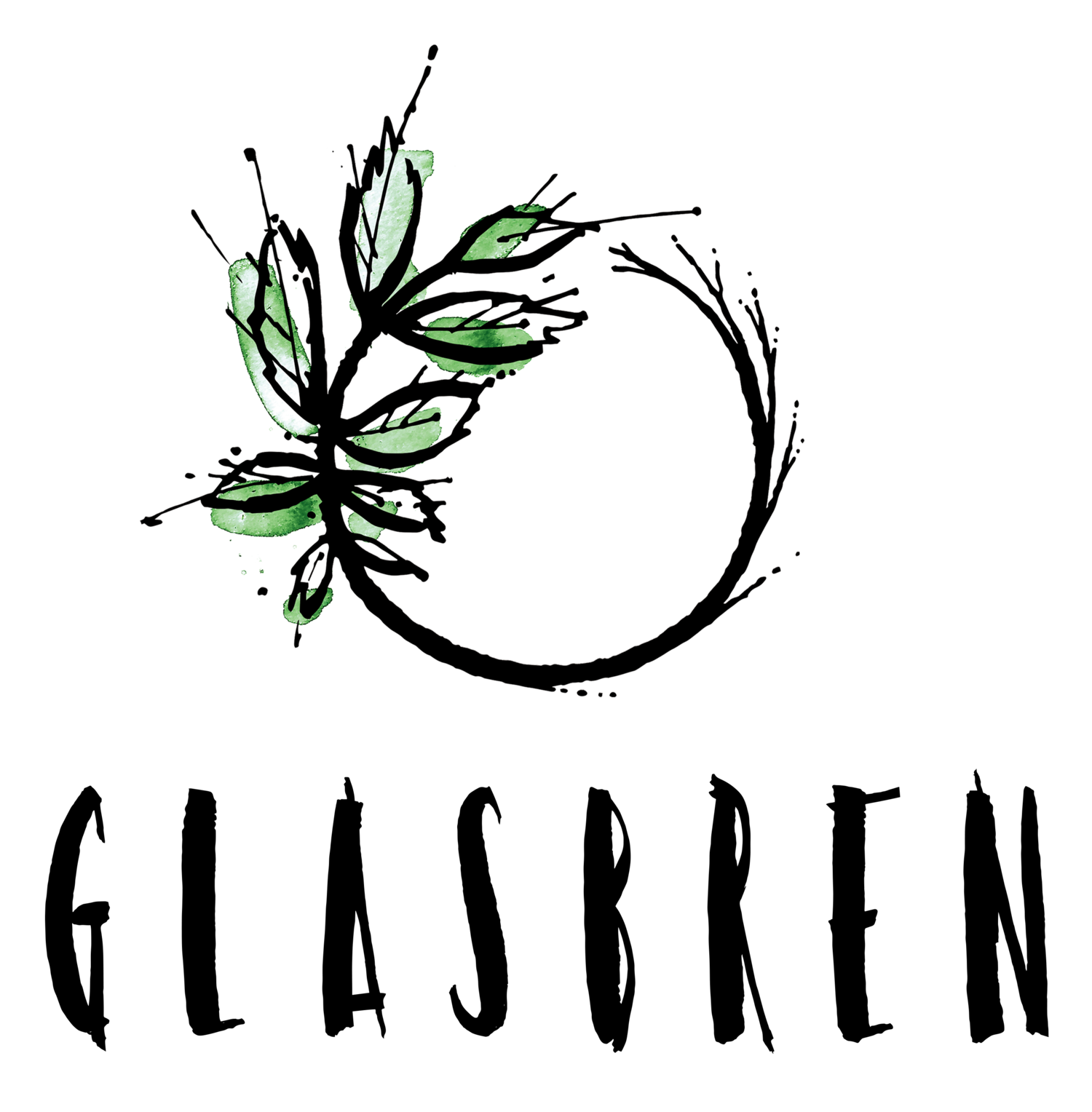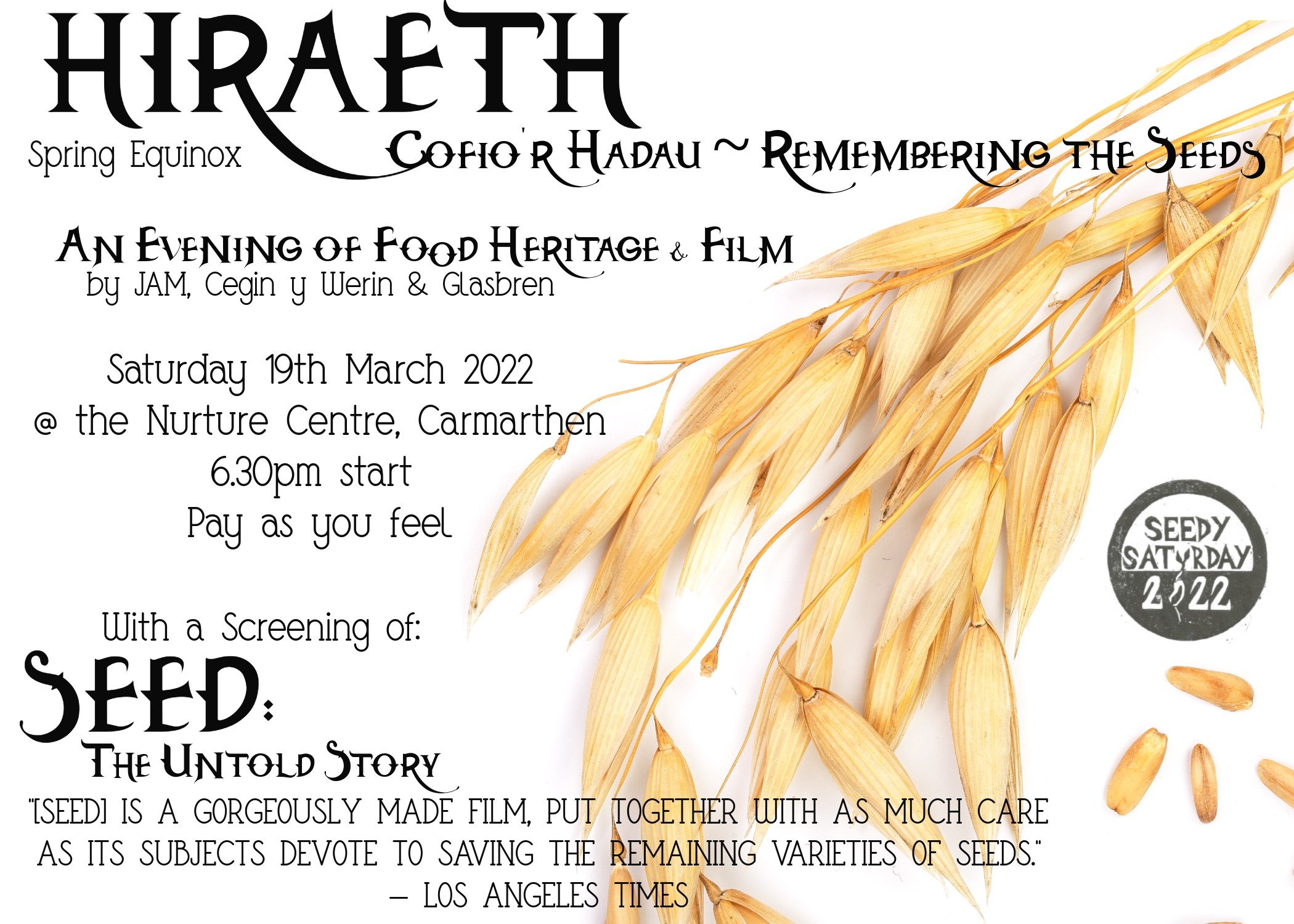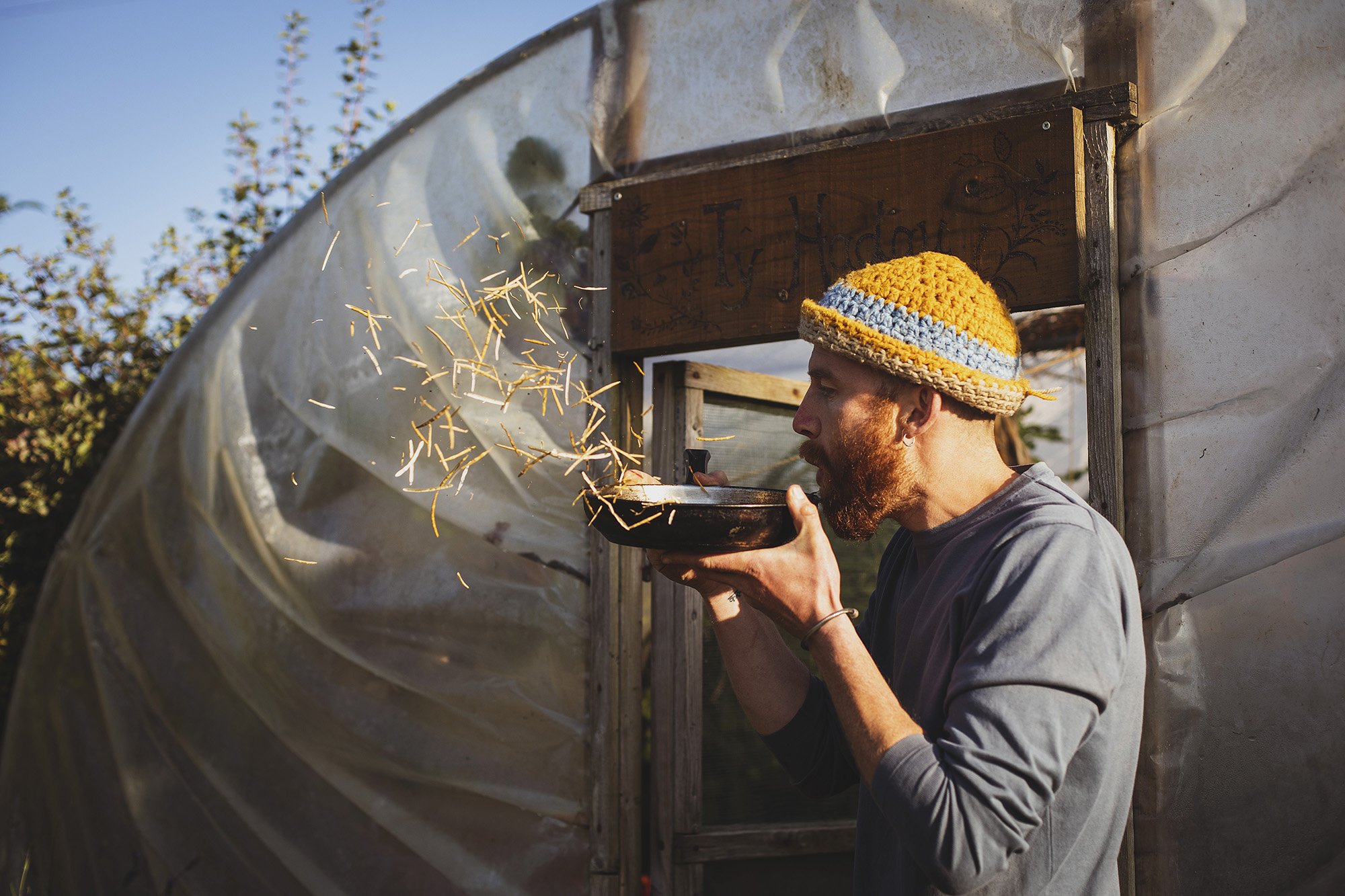Scribblings from Beyond the Veg #3 - A Weekend of Celebrating the Seeds
“Seed is not just the source of life. It is the very foundation of our being”
It’s just 7 days until we host Carmarthen’s festival of all things seeds - Seedy Saturday Carmarthen ~ Dydd Gwyl Hadau Caerfyrddin, when we’ll bring together local seed groups, environmental organisations, community groups, producers and makers for the usual eco fayre, as well as street food from Cegin y Werin, seed saving workshops from the woman who, literally, wrote the book on seed saving, Sue Stickland and an extra special evening of food & film ‘HIRAETH: Cofio’r Hadau ~ Remembering the Seeds’…
So I thought, in this edition of ‘Scribblings from Beyond the Veg’, I’d delve deeper into why seeds matter so much, why we must honour their stories and heritage, and why they hold the answers to food sovereignty and independence. Seeds, ‘intimate immensities’ as my mentor, the wonderful Mowhawk seedkeeper Rowen White calls them, hold the potential for all life. Planting a seed is an act of faith. We fall on our knees in the dirt, fill our palm with a handful of tiny seeds and commit them gently to the furrow in front of us. We surrender this seed, full of the potential for life-giving food, to our soil, faithful that it will provide what the seed needs, that the sun will shine, the rain will fall and that the wildlife we share the land with will leave them be. That the seed will break open, sacrifice itself for the plant we need it to be. That act of faith, if all goes as we hope it will, not only brings food, but the wonder & awe we all need to find again in the natural world.
Over recent years, I’ve become a passionate seed saver, driven not only to secure a bank of open-pollinated, locally-adapted and carefully selected varieties to grow the food for our veg boxes, but also to discover the stories in the old, heritage varieties and to write new stories that we might pass on to the next generation with the seeds. I have been inspired by the work going on in the UK around seed sovereignty, particular in the work of the Gaia Foundation’s Seed Sovereignty programme. But I’ve also found guidance and mentorship in seedkeepers further afield, who demonstrate how to live in reverance and celebration of the seeds, who acknowledge the gravity of the intergenerational work they are doing and take so seriously their efforts to discover and rediscover seed varieties inextricably bound to a culture and a history, and to stewards them safely on into the future. Not in climate-controlled seed banks, but by growing them.
One such teacher has been Rowen White, whose Seed Seva Mentorship I’ve been following over the last couple of seasons, who calls for us to save seeds as vital activism and the intergenerational work of securing food, heritage and belonging to be passed on to the ones to come.
Water that seed planted deep inside the earth that is your own body, a tiny seed that sings an achingly beautiful song of remembrance, resistance, resilience, redemption, reconciliation.
Rowen White
At Glasbren, we only use open-pollinated seed. This means that it has been naturally pollinated, by bees and other insects, not in a lab. We use organic and often biodynamic seed and rare, heritage varieties sourced mainly from four small seed companies - the long-standing Real Seed Catalogue, based in Newport, Pembrokeshire, The Seed Cooperative in Spalding, Vital Seeds, in Devon and the newly formed Wales Seed Hub. And we also save our own seed. When the COVID-19 crisis hit, it became more and more difficult to source the seed we needed. Seed savers working in these companies were going off sick or self-isolating and a surge in veg growing at home meant that alot of them were suddenly running at a shortage. We realised that we needed to put alot more effort into growing and saving our own seed. This coming season, around half od the seed we’ll be using is saved seed.
Why Save Seed?
“learning to save seed, becoming informed about seed justice and standing up for seed rights in our communities and on political platforms are critical first steps to attaining food sovereignty around the world.”
There are many good reasons to save seed. Firstly, it saves us money. It gives us the security of knowing we’ll have seed for next season, the season after that and long into the future. But more importantly, it gives us control and sovereignty when most of the world’s seed, and hence its food, is owned by large corporations. It means we can keep the unique genetic code, the diversity, the stories, the history and the culture embedded in seed alive, and adapt them to our climate and soil. We must honour, protect and carry the seeds on.
Abel winnows seed outside the ‘Ty Hadau’ (Seed House)
In 2020, we also formed a seed circle with a few other growers from around Carmarthenshire, to share the work and the knowledge of seed saving and to start to build up a collective bank of open-pollinated seed that we can all rely on. Trying to save the whole range of seeds yourself is very difficult, if not impossible, due to time and space constraints, and not to mention overhwelming! Seed circles are a fanstastic way to work together to produce the full range of vegetable seeds, for each person to specialise in the seed they like growing and that makes sense in their context, and it is a way for growers to get together to share seeds and stories, information and knowledge, food and cheer.
We’ll be growing a few varieties in our seed garden, isolated from the main food garden to protect from cross-pollination and to keep the varieties true. We’re particularly excited by one variety of kale, Sutherland Kale, that we’re growing in the seed garden. "Càil Cataibh" in Gaelic, the seed originated from Ullapool, in the North of Scotland, with the following story:
“ It’s an old variety grown by the crofters. The old lady the kale came from is Elizabeth Woolcombe, of West Drummie in Sutherland. She is in fact 93. The seed was given to her 50 years ago by Angus Simmonds, when he was doing research on kales at Edinburgh University”
It is the most vigorous and resilient kale we have seen. It’s also got a story. Our job is to keep the story alive by saving the seed.
Seed Sovereignty
“For me, food sovereignty is sovereignty over your life, livelihood and health. We are interconnected, therefore food sovereignty is an ecological process of co-creation with other lifeforms. It begins with seed sovereignty: saving and using living seeds.”
It is not just the food on our plate that begins with seeds, but the whole movement for a fairer, more regenerative food system. Throughout history, seeds have been bred and shared openly between farmers, communities and governments, and in many cultures, the saving, sharing and storying of seeds has been a vital part of community life and a resilient way of life on the land. But with the pressures of feeding a growing population after World War Two, we began to see a major shift away from open-pollinated seeds to hybrid seeds. Hybrid seeds were productive and had been bred for pest resistance and shelf life. Easy access to hybridised seed and a decline in rural populations and seed saving expertise led to a huge loss of seed diversity. This is a similar story across the world, as the so-called ‘Green Revolution’ re-oriented peasant, traditional and small-scale food producing communities towards industrialised, hybridised farming, and a tragic 75% loss of agricultural diversity.
Seed diversity is crucial to our ability to adapt to a changing climate and weather patterns. Saving and sharing seeds, on small-scale farms and within communities across the country and the world a way we can play our part. Seeds can connect us to our family histories, neighbours, and landscapes, deepening our roots of belonging and conserving our heritage in living plants. They are an endless source of awe and wonder. They are wealth, and health and abundance for future harvests.
If you’d like to learn more about saving your own seed, please join us at this year’s Seedy Saturday Carmarthen, where Katie Hastings from the Gaia Foundation Seed Sovereignty programme will be offering seed saving workshops and a discussion between seed circles in our area to see how we might work together. Or why not join us in September for our FREE* workshop, ‘Seeds of Resilience ~ An Introduction to Seed Saving’. Find out more here. If you can’t save your own seeds, we’d encourage you to try to buy open-pollinated seeds. To find out more about the movement for seed sovereignty, why not join us for a screening of ‘SEED: The Untold Story’ in Carmarthen on Saturday 19th March? You can book your tickets here…



